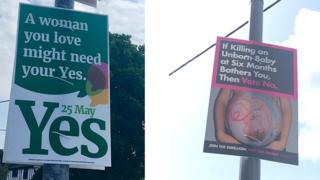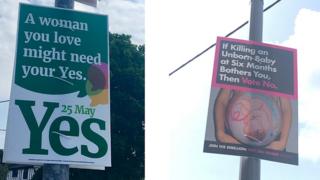Fake news is ‘reinforced by false memories’

 Image copyright Gillian Murphy
Image copyright Gillian Murphy A study into false memories highlights the risks of “fake news” spreading via social media.
Volunteers were shown fabricated news reports in the week before Ireland’s 2018 abortion law referendum.
Nearly half of them subsequently claimed to have had prior memories of at least one of the made-up events detailed.
And many failed to question their false recollections even after being told the articles they had read might be fake.
The 3,140 participants had been more likely to have created false memories if the reports had lied about the side they had opposed, the study added.
The peer-reviewed work supports prior research into the phenomenon. But its authors say it is the first time the problem has been tested in relation to a real-world referendum at the time it was being held.
One of academics told BBC News it highlighted how difficult it could be to “undo” spurious memories once they had been created.
“Memory is a reconstructive process and we are vulnerable to suggestion distorting our recollections, without our conscious awareness,” Dr Gillian Murphy, of University College Cork, said.
“The implications for any upcoming elections are that voters are vulnerable to not just believing a fake news story but falsely recalling that the [made-up] event truly happened.”
‘Hard to correct’
Facebook used to display red warning flags alongside news stories third-party websites had judged to be fake news. But it ditched the strategy after saying it could entrench deeply held beliefs rather than calling them into question.
Instead, it and other social networks now aim to limit the spread of fake stories, provide wider context and shut down state-backed propaganda accounts.
Even so, one UK-based fact-checking charity said more needed to be done.
“These findings are concerning and link to previous studies showing how once something is in our memory, it is harder to correct it,” said Amy Sippitt, research manager at Full Fact.
“That’s why it’s important to tackle the causes of bad information to prevent it from arising in the first place.”
Made-up memories
The danger of fake news leading to false memories has been known about for years.
One notable study in 2012 reported how participants had been led to misremember US President Barack Obama shaking hands with Iran’s President, Mahmoud Ahmadinejad, even though there was no public record of such an event, as well as US President George W Bush entertaining a baseball player at his Texas ranch when Hurricane Katrina hit New Orleans, in 2005, even though he had been at the White House at the time.
The new study explored whether this effect could be induced during the 2018 referendum. The vote ultimately led to abortions becoming legal in the Republic of Ireland.
Each participant was shown six news reports, two of which were fake.
One example involved the forced destruction of campaign posters said to have been illegally bought with foreign funds.
Yes voters were more likely to claim they remembered this happening if the story involved the No campaign – and vice versa.
What is more, some even claimed to recall further details about the misdeeds that had not been included in the faked reports.
“It shows why we need to understand how individual stories can be used to portray a wider narrative,” said Ms Sippitt.
“It’s therefore important not to deal with the accuracy of claims in isolation but also to look at the bigger picture these depict.”


